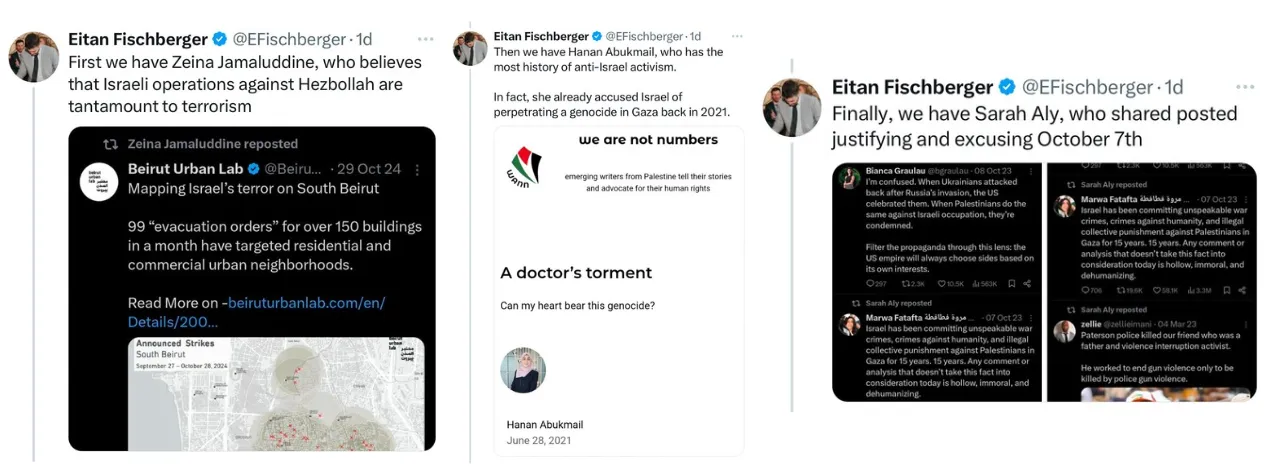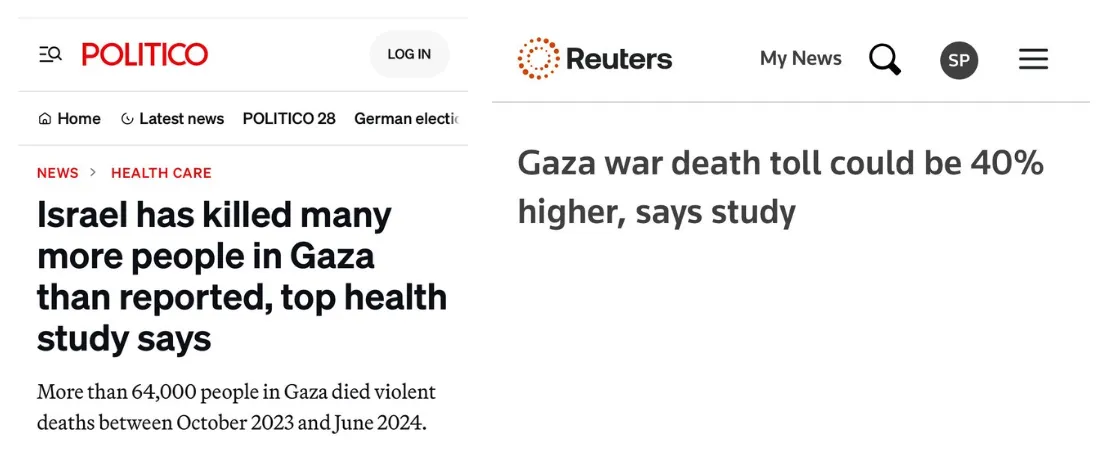RSS
Biased Science: The Lancet Claims Gaza Casualty Count Underreported

Pro-Hamas demonstrators, many of whom are college students, in New York City on May 11, 2024. Photo: John Lamparski via Reuters Connect
The Lancet has a history of publishing agenda-driven and politicized anti-Israel content that goes way beyond the field of healthcare and medicine.
In July 2024, the medical journal was called out for outrageously claiming that as many as 186,000 Gazans had been killed in the current war. Many media outlets rushed to print dramatic headlines under the imprimatur of The Lancet — a significant error given that the casualty claims came not from a peer-reviewed study but from a letter sent to The Lancet, whose writers included at least one with a history of defending Palestinian terrorism.
Now, The Lancet has published a study claiming that the Gaza death toll may have been underreported by 41%.
While this time claims concerning Gaza casualty figures appear in The Lancet in the form of an actual scientific study, the recent report still has numerous similarities with the previous claims, namely a reliance on faulty Hamas sources and a disturbing lack of impartiality on the part of its authors, including one who justified Hamas’ October 7 massacre.
Faulty Science
Even without delving deeply into the numbers, The Lancet’s study is based on a false premise: the accuracy of Palestinian Ministry of Health casualty figures. Openly stating that its methodology is based on this source is effectively admitting that Hamas provides the numbers:
We used a three-list capture–recapture analysis using data from Palestinian Ministry of Health (MoH) hospital lists, an MoH online survey, and social media obituaries.
Furthermore, experts found faults in the study’s number-crunching as well as it other sources, and published their conclusions online:
Again @TheLancet medical journal published pseudo-scientific Palestinian propaganda, dressed up with graphs, meaningless algorithms & fake data from Hamas/Palestinian sources, UN agencies that parrot Hamas etal, and “Euro-Med Human Rights Monitor” – a notorius Hamas-run NGO… pic.twitter.com/SdfDpRuvND
— Prof Gerald M Steinberg (@GeraldNGOM) January 10, 2025
Who’s Behind the Study?
Most disturbingly, the study’s authors were exposed by media analyst Eitan Fischberger. One of them posted about Israel’s “terror” in Lebanon, another accused Israel of committing a genocide, and yet another justified Hamas’ October 7 attack on Israel:
Many media outlets are buzzing about a new @TheLancet study claiming Gaza deaths are undercounted by 41%.
I’ll leave the number-crunching to others, but it’s worth noting that most of the study’s authors are radically anti-Israel—which is already cause to doubt their analysis
pic.twitter.com/F45XcZvYIh
— Eitan Fischberger (@EFischberger) January 10, 2025

The Media Coverage
Throughout the conflict, the media have unquestioningly republished Gazan casualty figures whose ultimate source is Hamas. They’ve quoted Hamas’ numbers uncritically, while adding caveats whenever Israel has offered its own estimates, particularly concerning the number of dead terrorists.
So it’s hardly surprising that numerous outlets saw fit to cover The Lancet’s study.
Disappointingly, given its previous in-depth coverage of the Henry Jackson Society’s study on inflated Gaza casualty figures, The Telegraph‘s report on The Lancet study failed even to mention that the Palestinian Ministry of Health’s data was courtesy of the Hamas-run ministry in Gaza.
The BBC and The Guardian, meanwhile, took the opportunity to blame Israel for not letting foreign journalists into Gaza as the reason why casualty figures could not be independently verified by the media.
These outlets and Reuters did at least include some Israeli reaction (albeit relatively generic), as well as the fact that the study’s figures don’t differentiate between combatants and civilians.
Outlets like CNN and Politico, however, simply parroted the study without any caveat.
For example, here’s Politico’s headline as opposed to the more careful phrasing of Reuters:

But the fact remains that all these outlets should have been more critical of The Lancet’s study, which was thoroughly debunked on social media. Because, unlike those who did the debunking, journalists still have no issue with relying on sources like the Hamas-run Ministry of Health in their everyday reporting, and nor did they do any due diligence on the study’s authors.
Thanks to The Lancet’s professional (albeit undeserved) reputation and the media’s penchant for reporting a source that it treats as beyond criticism, this latest anti-Israel claim has the potential to become part of a narrative that has already accepted disputed casualty figures as fact.
The author is a contributor to HonestReporting, a Jerusalem-based media watchdog with a focus on antisemitism and anti-Israel bias — where a version of this article first appeared.
The post Biased Science: The Lancet Claims Gaza Casualty Count Underreported first appeared on Algemeiner.com.
RSS
After False Dawns, Gazans Hope Trump Will Force End to Two-Year-Old War

Palestinians walk past a residential building destroyed in previous Israeli strikes, after Hamas agreed to release hostages and accept some other terms in a US plan to end the war, in Nuseirat, central Gaza Strip October 4, 2025. Photo: REUTERS/Mahmoud Issa
Exhausted Palestinians in Gaza clung to hopes on Saturday that US President Donald Trump would keep up pressure on Israel to end a two-year-old war that has killed tens of thousands and displaced the entire population of more than two million.
Hamas’ declaration that it was ready to hand over hostages and accept some terms of Trump’s plan to end the conflict while calling for more talks on several key issues was greeted with relief in the enclave, where most homes are now in ruins.
“It’s happy news, it saves those who are still alive,” said 32-year-old Saoud Qarneyta, reacting to Hamas’ response and Trump’s intervention. “This is enough. Houses have been damaged, everything has been damaged, what is left? Nothing.”
GAZAN RESIDENT HOPES ‘WE WILL BE DONE WITH WARS’
Ismail Zayda, 40, a father of three, displaced from a suburb in northern Gaza City where Israel launched a full-scale ground operation last month, said: “We want President Trump to keep pushing for an end to the war, if this chance is lost, it means that Gaza City will be destroyed by Israel and we might not survive.
“Enough, two years of bombardment, death and starvation. Enough,” he told Reuters on a social media chat.
“God willing this will be the last war. We will hopefully be done with the wars,” said 59-year-old Ali Ahmad, speaking in one of the tented camps where most Palestinians now live.
“We urge all sides not to backtrack. Every day of delay costs lives in Gaza, it is not just time wasted, lives get wasted too,” said Tamer Al-Burai, a Gaza City businessman displaced with members of his family in central Gaza Strip.
After two previous ceasefires — one near the start of the war and another earlier this year — lasted only a few weeks, he said; “I am very optimistic this time, maybe Trump’s seeking to be remembered as a man of peace, will bring us real peace this time.”
RESIDENT WORRIES THAT NETANYAHU WILL ‘SABOTAGE’ DEAL
Some voiced hopes of returning to their homes, but the Israeli military issued a fresh warning to Gazans on Saturday to stay out of Gaza City, describing it as a “dangerous combat zone.”
Gazans have faced previous false dawns during the past two years, when Trump and others declared at several points during on-off negotiations between Hamas, Israel and Arab and US mediators that a deal was close, only for war to rage on.
“Will it happen? Can we trust Trump? Maybe we trust Trump, but will Netanyahu abide this time? He has always sabotaged everything and continued the war. I hope he ends it now,” said Aya, 31, who was displaced with her family to Deir Al-Balah in the central Gaza Strip.
She added: “Maybe there is a chance the war ends at October 7, two years after it began.”
RSS
Mass Rally in Rome on Fourth Day of Italy’s Pro-Palestinian Protests

A Pro-Palestinian demonstrator waves a Palestinian flag during a national protest for Gaza in Rome, Italy, October 4, 2025. Photo: REUTERS/Claudia Greco
Large crowds assembled in central Rome on Saturday for the fourth straight day of protests in Italy since Israel intercepted an international flotilla trying to deliver aid to Gaza, and detained its activists.
People holding banners and Palestinian flags, chanting “Free Palestine” and other slogans, filed past the Colosseum, taking part in a march that organizers hoped would attract at least 1 million people.
“I’m here with a lot of other friends because I think it is important for us all to mobilize individually,” Francesco Galtieri, a 65-year-old musician from Rome, said. “If we don’t all mobilize, then nothing will change.”
Since Israel started blocking the flotilla late on Wednesday, protests have sprung up across Europe and in other parts of the world, but in Italy they have been a daily occurrence, in multiple cities.
On Friday, unions called a general strike in support of the flotilla, with demonstrations across the country that attracted more than 2 million, according to organizers. The interior ministry estimated attendance at around 400,000.
Italy’s right-wing government has been critical of the protests, with Prime Minister Giorgia Meloni suggesting that people would skip work for Gaza just as an excuse for a longer weekend break.
On Saturday, Meloni blamed protesters for insulting graffiti that appeared on a statue of the late Pope John Paul II outside Rome’s main train station, where Pro-Palestinian groups have been holding a protest picket.
“They say they are taking to the streets for peace, but then they insult the memory of a man who was a true defender and builder of peace. A shameful act committed by people blinded by ideology,” she said in a statement.
Israel launched its Gaza offensive after Hamas terrorists staged a cross border attack on October 7, 2023, killing some 1,200 people and taking 251 people hostage.
RSS
Hamas Says It Agrees to Release All Israeli Hostages Under Trump Gaza Plan

Smoke rises during an Israeli military operation in Gaza City, as seen from the central Gaza Strip, October 2, 2025. Photo: REUTERS/Dawoud Abu Alkas
Hamas said on Friday it had agreed to release all Israeli hostages, alive or dead, under the terms of US President Donald Trump’s Gaza proposal, and signaled readiness to immediately enter mediated negotiations to discuss the details.

